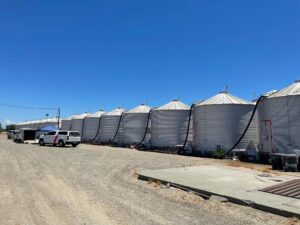A Greener Approach to Fumigation
Fumigations: a pillar of Sprague's environmental stewardship
Challenge
Did you know that of the 40 million tons of plastic waste generated in the United States last year, only five to six percent—or about two million tons— was recycled? About 85 percent went to landfills, and ten percent was incinerated.

We all understand the importance of being good stewards of the environment and Sprague is doing its part. Sprague’s Environmental Stewardship Pledge includes reducing the amount of rodenticide used and transforming its service fleet to electric and eco-friendly vehicles.
Sprague is also extending the pledge to its fumigation services. With a service footprint extending across 10 Western states and the company performs fumigations – structural and container – from a third of its service centers. The types of structures and commodities fumigated run the gamut from grass seed to hazelnuts to shipping pallets.
Fumigation is an effective, quick method for commercial properties, especially those in the food storage or transportation markets, to knock-down pests on a large-scale. It eliminates pests in all stages of development, from eggs to adult bugs and can reach areas of a structure or container where other treatment methods cannot.
The structural fumigation process typically involves tarping structures. The tarp is used over the structure to trap the gas inside. The gas penetrates cracks, crevices, and the commodities inside the structure to eliminate pests, including stored product pests such as Indian meal moths, various species of beetles, and mice. Depending on the size of the structure, the amount of plastic that is required can be significant.
Solutions
Instead of adding to the 6.3 billion tons of plastic that ends in at landfills annually, Sprague Eugene Branch Manager Sean Candelaria found a way to lessen that number by reusing the plastic tarping rather than discarding it after one use.
“We perform fumigations that can involve one structure or 14 structures, and we can use a significant amount of plastic tarping in the process,” says Candelaria. “Rather than fill up two dumpsters after a job, we thought why not reuse it.”
The idea was two-fold: Sprague would save money – Candelaria says the price of plastic has risen sharply in the last year – by not having to reorder for each job and there would be less plastic headed to the landfill.
Results
A Sprague fumigation client, a large, dried commodity storage facility, is a good example of where the company has been able to reduce plastic usage significantly. The job is labor intensive and involves tarping up to 20 storage bins (the bins are 20 ft. x 70 ft.) and leaving it in place for a week.
Due to the size of the bins, a significant amount of plastic tarping is used during the job but instead purchasing new rolls for each fumigation, Sprague chose to reuse the plastic and store it on site between jobs. By reusing the tarping, it has been three years since Sprague had to buy new tarps.
“By reusing the plastic, we have been able to reduce our expenses on plastic tarping by almost 80 percent without compromising service quality or safety,” says Candelaria, who launched the reuse initiative 18 months ago.
Before making the switch, Sprague used close to 400 ft. of plastic per job and now they use less than 100 ft. of new plastic per fumigation. Candelaria says his team gets five to 10 additional uses out of the tarping and that the company went nearly a year without having to reorder.
When asked why he undertook this effort, Candelaria said it was Sprague’s corporate commitment to be good stewards of the environment that inspired him.
“We are always being challenged and asking ourselves ‘How can we perform our services more responsibly across the board?’” said Candelaria. “It’s an attitude we all share and one that hopefully will have an impact for generations to come.”
Discover The Sprague Difference
If you are looking for an innovative pest management service provider for your next fumigation, connect with the Sprague pest management experts at 800.272.4988.
